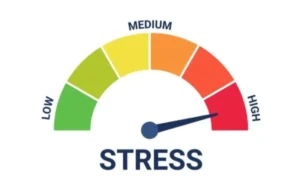Stress is an inevitable part of life. While many associate stress with negativity, it’s important to understand that not all stress is harmful. In fact, a certain level of stress is natural and even beneficial for growth and performance. The stress normal range refers to the level of stress that can enhance productivity and motivation, helping individuals meet deadlines and overcome challenges. However, knowing the boundaries of “normal stress” and when it becomes harmful is essential for maintaining mental and physical well-being. In this guide, we’ll explore what constitutes normal stress, how to recognize healthy levels, and strategies to manage it effectively.
Understanding Stress: The Basics
Stress is how your body reacts to challenges or demands in your life. It activates the “fight or flight” mechanism, releasing hormones like cortisol and adrenaline to help you deal with the situation. While this response is critical for survival, prolonged or excessive stress can have adverse effects on your health.
What Is the Stress Normal Range?
The stress normal range refers to a level of stress that is manageable and does not interfere with daily life. It often serves as a motivator, helping you meet deadlines, perform well under pressure, or adapt to changes. However, when stress surpasses this range and becomes chronic, it can negatively impact mental and physical health.
The Stress Level Scale

Stress levels can be categorized on a scale:
- Low Stress: Little to no activation of the stress response. Often associated with relaxation or boredom.
- Moderate Stress: Optimal level of stress that enhances performance and productivity.
- High Stress: Overwhelming stress that can hinder functioning and lead to health issues.
Recognizing where you fall on the stress level scale is the first step toward understanding your stress normal range.
Signs of Healthy Stress Levels
Healthy stress, also known as eustress, can be a driving force for achieving goals and overcoming challenges. Here are signs that you’re experiencing stress within a normal range:
- Motivation to Accomplish Tasks: Feeling energized to complete a project or meet a deadline.
- Improved Focus and Performance: Experiencing heightened concentration and productivity.
- Temporary Nature: Stress dissipates after the challenge or task is resolved.
- Absence of Chronic Symptoms: No prolonged physical or mental health symptoms, such as fatigue or anxiety.
When Stress Becomes Harmful
Stress crosses into harmful territory when it becomes chronic or severe. Warning signs include:
- Physical Symptoms: Headaches, muscle tension, fatigue, or digestive issues.
- Emotional Symptoms: Irritability, anxiety, or depression.
- Behavioral Changes: Difficulty sleeping, overeating, or withdrawing from social interactions.
- Impact on Daily Life: Struggling to meet obligations at work, home, or school.
If these symptoms persist, it’s essential to seek professional help. At Pushpa Mind Care, Dr. Samyuktha Gangadhar specializes in diagnosing and treating stress-related conditions to help patients regain balance.
What Is a Stress Booster?
A stress booster refers to external or internal factors that temporarily increase stress levels. While some stress boosters can be motivating, others can amplify unhealthy stress. Examples include:
- Positive Stress Boosters: Preparing for an important event, learning a new skill, or pursuing a challenging goal.
- Negative Stress Boosters: Unresolved conflicts, poor time management, or financial difficulties.
Recognizing your stress boosters can help you manage them effectively and stay within a healthy stress range.
Tips to Stay in the Stress Normal Range

Maintaining stress within a healthy range involves proactive strategies and lifestyle changes. Here are some tips:
1. Practice Time Management
Organize your tasks and set realistic goals to prevent feeling overwhelmed. Prioritizing responsibilities can help you focus on what matters most.
2. Develop Healthy Coping Mechanisms
Engage in activities that promote relaxation and mental well-being, such as:
- Exercise: Physical activity reduces cortisol levels and boosts endorphins.
- Meditation and Mindfulness: Helps calm the mind and improve focus.
- Hobbies: Engaging in creative or recreational activities can provide a healthy outlet for stress.
3. Build a Support System
Surround yourself with supportive friends and family who can offer encouragement and understanding.
4. Monitor Your Stress Levels
Regularly assess your stress level scale to ensure you remain within a healthy range. Journaling or using stress tracking apps can help you stay aware of your stress patterns.
5. Seek Professional Help When Needed
If stress becomes unmanageable, don’t hesitate to consult a professional. Dr. Samyuktha Gangadhar at Pushpa Mind Care offers personalized care to address stress-related challenges and promote mental health.
The Importance of Understanding Your Stress Level Scale
Recognizing your stress level scale is vital for maintaining a healthy balance. By identifying your triggers and responses, you can:
- Prevent Burnout: Avoid the negative consequences of chronic stress.
- Enhance Performance: Utilize eustress to achieve your goals.
- Improve Well-Being: Foster a positive outlook and better health.
When to Seek Help
If you experience any of the following, it may be time to seek professional guidance:
- Persistent feelings of overwhelm.
- Inability to relax or enjoy activities.
- Physical symptoms that interfere with daily life.
- Difficulty managing relationships or responsibilities.
At Pushpa Mind Care, we’re committed to helping you understand and manage your stress. With her expertise, Dr. Samyuktha Gangadhar can provide tailored strategies to help you regain control and improve your quality of life.
Conclusion
Stress is a natural part of life, but understanding the stress normal range is essential for maintaining health and well-being. By recognizing the signs of healthy stress, identifying your stress boosters, and implementing effective coping strategies, you can achieve a balanced and fulfilling life. Remember, professional support is always available if you need it.
For personalized care and expert guidance, contact Pushpa Mind Care and schedule a consultation with Dr. Samyuktha Gangadhar, M.D. (Psychiatrist). Together, we can help you navigate stress and lead a healthier, happier life.
FAQs About Social Anxiety Disorder
A manageable level of stress is normal, helping you stay focused and energized during daily tasks. It drives you to meet deadlines and handle responsibilities effectively. Dr. Samyuktha Gangadhar, M.D., provides personalized care to ensure your stress remains balanced and productive, without crossing into unhealthy territory.
Stress can vary from:
- Low Stress: Feeling calm and in control.
- Moderate Stress: Helping you stay motivated and on track.
- High Stress: When it becomes overwhelming, affecting your physical and mental health.
If your stress is reaching a high level, Dr. Samyuktha Gangadhar can help you manage it, preventing long-term effects on your well-being.
Normal stress triggers the body’s natural response, giving you a temporary boost in focus and energy. When stress is well-managed, it enhances your performance. However, if it becomes chronic, it can negatively impact your health. Dr. Samyuktha Gangadhar offers expert guidance to help you restore balance and reduce the impact of stress on your body and mind.
Excessive stress becomes too much when it lingers and begins to interfere with your life. If stress affects your relationships, work, or health, it’s time to seek help. Dr. Samyuktha Gangadhar, M.D., provides professional support to help you manage and overcome overwhelming stress, allowing you to regain peace and well-being.

